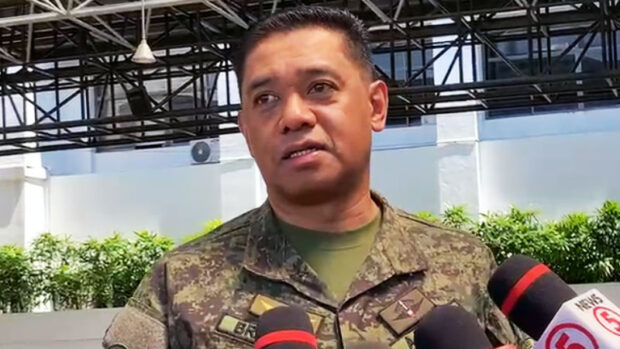
Armed Forced Chief of Staff Gen. Romeo Brawner Jr. —INQUIRER file photo / John Eric Mendoza
The military training exchange program between the Philippines and China has been put on hold following the Aug. 5 incident where China Coast Guard vessels fired water cannons at Filipino boats on a resupply mission to the grounded BRP Sierra Madre at Ayungin (Second Thomas) Shoal, Armed Forced Chief of Staff Gen. Romeo Brawner Jr. told Congress on Wednesday.
At his confirmation hearing before the Commission on Appointments (CA), Brawner said the AFP was reviewing the program set under a 2004 agreement between Manila and Beijing as one of the areas of bilateral defense cooperation.
“As of now, your honor, after that incident last Aug. 5—the blocking of our resupply ship and the water cannoning of our Coast Guard—I ordered the temporary stoppage of sending officers to China,” Brawner told CA members.
The military chief made the disclosure in answer to questions from Sen. Francis Tolentino, vice chair of the Senate committee on foreign relations, on the program’s current status.
Brawner clarified that he was not taking issue against any officer or cadet who may have undergone training in China as part of the exchange program.
“They have no fault; that should be a badge of honor because probably they were only obeying orders, and that they had this opportunity to study abroad perhaps by way of bilateral agreements, officer exchange program or [because of] limited educational opportunities,” he said.
Shades of Pearl Harbor
Tolentino raised the matter, a topic he also brought up last week, saying it reminded him of a Netflix movie on the 1941 attack on Pearl Harbor.
“There is this famous Japanese admiral, Isoruko Yamamoto, who is a graduate of the United States Naval Academy in Annapolis, but he was the one who masterminded the Pearl Harbor attack,” he said.
Tolentino cited a list that he said named 17 AFP officers who had undergone various military training courses in China.
“I have nothing against them; in fact, we should be proud of these officers because they now know Chinese culture, and may already be able to speak the language, so that’s irrelevant at this point,” he said.
Citing records, Tolentino said a student from China is currently studying at the National Defense College at Camp Aguinaldo, the AFP headquarters in Quezon City.
Told of this, Brawner pointed out that the AFP had participated in exchange programs with several countries, not only China.
Defense ties reassessed
But in response to the Aug. 5 incident, the AFP is no longer sending its officers for training with China, he said.
“In fact just last week, there was a communication—an invitation from China, for us to send cadets to China to join the conference of cadets from all over the world. We used to send our officers but we will not be sending any this year,” he said.
“So it’s not just the sending of soldiers but we are also assessing our actual military relationship with China, especially after the (Aug. 5) incidents that happened,” he added.
In revisiting the terms of the 2004 agreement with China regarding the program, some provisions may have to changed, to which Beijing must also agree, the AFP chief said.